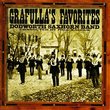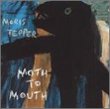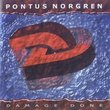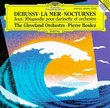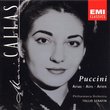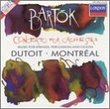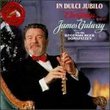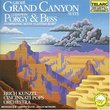| All Artists: Alexander Scriabin, Vladimir Ashkenazy Title: Scriabin: The Piano Sonatas Members Wishing: 0 Total Copies: 0 Label: Decca Release Date: 8/26/1997 Genre: Classical Styles: Ballets & Dances, Dances, Forms & Genres, Sonatas, Historical Periods, Modern, 20th, & 21st Century, Instruments, Keyboard Number of Discs: 2 SwapaCD Credits: 2 UPCs: 028945296128, 002894529612 |
Search - Alexander Scriabin, Vladimir Ashkenazy :: Scriabin: The Piano Sonatas
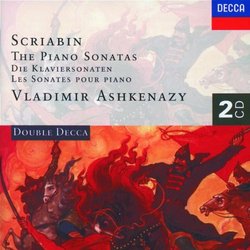 | Alexander Scriabin, Vladimir Ashkenazy Scriabin: The Piano Sonatas Genre: Classical
|
Larger Image |
CD DetailsSimilar CDs
Similarly Requested CDs
|
CD ReviewsStill my preferred set of Scriabin sonatas M. Hendrik | Ghent, Belgium | 12/31/2008 (4 out of 5 stars) "Despite its imperfections, I have come to look upon Vladimir Ashkenazy's complete set of Scriabin sonatas as the most satisfying compilation yet available. To be sure, the performances of the 2nd, 4th, 5th, 7th ánd 10th are lacklustre in some way or another, but because Ashkenazy's best performances (the other half) also rank among the best performances for these sonatas in general, his set seems more valuable to me than one which is merely consistent at rising above-average (Hamelin, Taub) but nothing more. It is rare for any compilation of Scriabin sonatas to contain more than two "hits". As mentioned, Ashkenazy delivers his strongest performances in the 1st, 3rd, 6th, 8th and 9th sonatas, but the 6th sonata in particular stands out. It is well known that Scriabin thought this sonata to be corrupted by demonic forces, going so far as to refuse to play the work in public. Whether true or not, the sonata is indeed a rather nightmarish piece. Its most striking aspect are the sudden bouts of terror marked "l'épouvante surgit", and it is in these sections where Ashkenazy convinces the most, building up tension in an almost convulsive manner and then releasing it quickly and forcefully. The result is a more agitated, terrifying 6th sonata than any other I've heard. Only Richter's performance is better, but unfortunately his recording is marred by poor sound quality. Ashkenazy's second best performance on this disc may be the 8th sonata. Few pianists play it well, perhaps due to its murky nature. The 8th sonata is a long, repetitive piece, seemingly without direction and lacking clear contrasts. It hardly seems worth the trouble. Yet under the hands of Ashkenazy it becomes a rather compelling, sinister lounge piece. Sofronitsky's 8th is slightly faster than Ashkenazy's and perhaps even better, but has a lesser recording quality. Ashkenazy's 1st sonata is another top ranking performance, but ultimately edged out by a superior Kocyan, who is more convincing in the first and second movements. I know opinions are extremely divided on the 3rd and 9th sonatas, so without rationalizing my choice too much I will say that Ashkenazy's recordings are the ones I keep coming back to. Below a short overview of my preferred picks for each individual sonata (in order of preference). I refer to my review of Taub's complete Scriabin sonatas for a more in-depth discussion: 01. Kocyan, Ashkenazy 02. Kocyan, Sofronitsky 03. Ashkenazy, Melnikov 04. Austbø, Gavrilov 05. Richter, Sudbin 06. Ashkenazy, Richter, Laredo 07. Richter (1965), Laredo 08. Ashkenazy, Sofronitsky 09. Ashkenazy 10. Hamelin, Volodos, Sofronitsky 11. Laredo Again, the absence of a decent 2nd, 4th, 5th, 7th and 10th may not recommend Ashkenazy's set, but since it features more hits than any other compilation that I know of, it is still my preferred choice for a complete set. In any case, the bottom line of my review is that there is just no single pianist who stands as the definitive interpreter of Alexander Scriabin. However, some of the most fanatical Scriabin devotees would do well to reconsider pianists of a "younger" generation, such as Ashkenazy and Laredo, among Scriabin's most important interpreters, instead of just worshipping the ground a Sofronitsky or Horowitz (who I generally find overrated) walked on. The older generation must be heard (Richter and Sofronitsky are essential), but not at the expense of modern recordings. Ashkenazy certainly has his place among the greats." An absolute bargin Doc Holliday | Great Northwest | 04/14/2007 (5 out of 5 stars) "These CDs have become one of my favorite recordings. Whether Ashkenazy is playing Rachmaninoff Preludes or Chopin, for my money, he consistently produces a direct, sensitive and non-pretentious approach to the music and the composer. What I like about his interpretation of the Scriabin Sonatas is that he plays Scriabin like a true modernist. No wonder Bill Evans, the late, great, jazz pianist, practiced Scriabin at home between club dates--the sonatas are filled with modern, lyrical beauty."
|

 Track Listings (15) - Disc #1
Track Listings (15) - Disc #1
